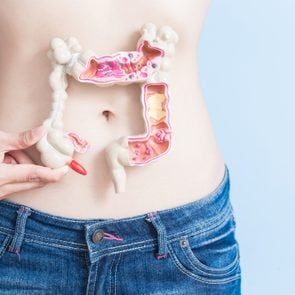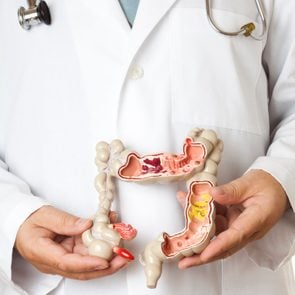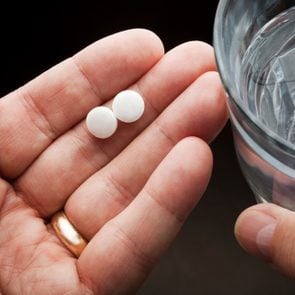I Was Diagnosed with Stage 4 Colon Cancer at Age 30
Updated: Jan. 02, 2024
After frequent bouts of painful diarrhea, constipation, and other symptoms, this man was diagnosed with stage 4 colon cancer.
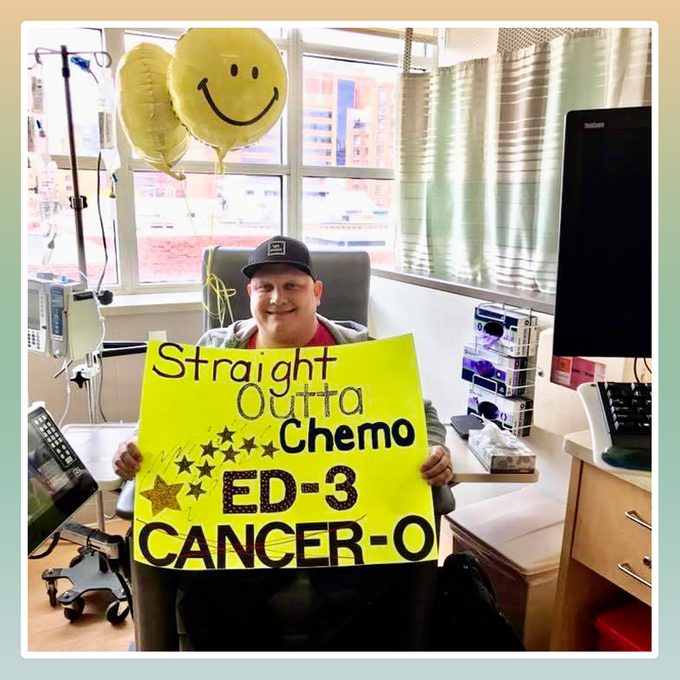
Colorectal cancer is the third most common cancer in the United States. And while rates have decreased in the last few decades thanks to better treatments and an increase in colorectal cancer screenings, there has been a small but concerning increase in the number of younger people being diagnosed with the disease. Ed Yakacki falls into that category, first experiencing colon cancer symptoms at age 27. Here, Yakacki shares his experience with cancer and how he made it through the diagnosis and treatment.
Early symptoms
In my 20s, I was a normal, healthy guy. Big and burly—six foot three and 275 pounds—working a union job and playing softball on the weekends. I’d been a weight lifter for a long time, even getting to the point where I could bench press 500 pounds.
When I was around 27 years old, I started to notice that my bathroom habits were a little off. Most of the time, I chalked it up to having gone out with my friends for beers and wings. Must have been something I ate, I figured.
But over the next year or two, things got worse. I would have really bad constipation, terrible diarrhea, or occasional blood in my stool. I didn’t tell anyone at first—I was ashamed and didn’t know who to talk to. Plus, it wasn’t something that men really talked about.
Eventually, it got so bad that I couldn’t hide it anymore. I went to the doctor, who started running tests. At first, they thought it was an infection or something like that. Problem was, they were never able to find anything.
The verdict: I was young and I looked fine, so it was probably nothing.
The phone call that changed my life
In the meantime, I was in pain constantly. I lost 40 pounds. At work, I would try to go to the bathroom close to 30 times a day, but nothing would come out. It got to the point where I was afraid to eat because I didn’t want to cause myself more pain. I couldn’t function like a normal human being.
One day I couldn’t take it any longer. I called my dad from work, crying and emotional because I was in so much pain, and I asked him to pick me up and take me to the emergency room. There I spoke to a doctor, telling him everything I had been experiencing, and he didn’t like the sound of it. He suggested I get in to see a gastroenterologist (GI doctor) for a colonoscopy.
A cancer diagnosis at 30
At first, it looked like I’d have to wait out the pain for another couple months—the first available GI appointment was six weeks out. It took some pleading to convince the doctor’s office that something was really wrong, but I was able to get in the following day. The test showed that my colon was really inflamed. Because I was only 30, the doctor suspected Crohn’s disease.
Still, I was miserable, and the doctor could tell. He sent me for an ultrasound just in case.
During the ultrasound, I watched the life drain from my doctor’s eyes. He told me I had colon cancer—stage 4, a three-inch tumor.
I didn’t hear anything else after that. It was like I was Charlie Brown and he was Charlie Brown’s mom on the phone. Instead, I thought of my mother, who died from stomach cancer when I was 22. And I thought, am I going to die too?
Starting chemo and radiation therapy
I met with a colorectal doctor, who prescribed me six weeks of chemotherapy and six weeks of radiation to destroy any cancer cells and prevent them from spreading. He found me a smaller facility nearby so I didn’t have to travel too far for treatment. I was still in a lot of pain, so they started right away.
The news, the instructions—it was all a blur, but the biggest thing I retained was that I couldn’t miss a treatment. So I didn’t, even when I continued to have discomfort using the bathroom. Even when I wound up with a burn at the top of my backside from which I still have scars today. I just wanted to get through it.
I finished the radiation and chemo, had six weeks off to convalesce, then it was time for surgery. I had never had surgery in my life, and here I was facing a major one. But it went well; the treatment had shrunk my tumor considerably.
They also performed an ileostomy, a surgical procedure that rerouted my way my body removed waste. I would be excreting waste into an external bag instead of the normal way.
My health was spiraling out of control
Unfortunately, things started to go wrong almost immediately. My stomach was swollen and I had a high fever. So two days later they opened me back up to find that waste was backing up in my body and making me sick. The surgeon fixed it, and for the first time since my diagnosis four months earlier, the finish line seemed to be in sight.
Two weeks later, in April of 2009, I returned to my doctor for a follow-up, hoping for good news…that I didn’t get. I had to keep wearing the bag. And the cancer was worse than they thought.
I’d need six months of aggressive chemo, my doctor said. The cancer had spread to my lymph nodes. I was a wreck. I couldn’t understand why these things were happening to me.
A brutal second round of chemo
The second round of chemo was brutal. I couldn’t eat, and I lost more weight, dropping all the way down to 160 pounds. And after about four months of treatment, we had to pause because my blood counts were low and I needed more tests. They took weeks, which was really frustrating. I was just trying to get through the treatments as quickly as possible so I could get back to my life, not realizing that my life was never going to be the same.
The tests came back that I needed surgery to resect another tumor on my liver. But I was adamant about continuing with my treatments while I waited, so I kept getting chemo. I had the surgery in September and finished my treatments in November.
The ileostomy nightmare
The final step was to reverse the ileostomy so I wouldn’t have to wear a bag. My surgeon agreed to do it but cautioned that it could take my body a while to adjust back to using the bathroom the normal way. I was more than willing to take the risk—I hated having the bag. I was traumatized by the constant leaks and could never get comfortable in bed because I was afraid of rolling over and breaking the bag.
What I assumed was the adjustment period was truly awful. It took me three months to admit to myself that my body wasn’t having trouble adjusting; something was wrong. Again.
I couldn’t eat. I was burning up. And I felt really sick all the time.
I went to the doctor and upon examination, he found a pin-sized hole near my rectum that had been caused by the radiation. Basically, I had been leaking stool into my body for months, and it had caused an infection that required emergency surgery.
They cleaned out the infection and gave me a colostomy bag, plus antibiotics to treat the infection because it was in my blood. By this point, I was so tired of the complications and setbacks that I just wanted to go home. I did, but going home meant lying for hours on the couch, on top of layers of pads of protection to catch the waste when I soiled myself. I was miserable and terrified that things would be like this for the rest of my life.
Coming to terms with wearing a colostomy bag
Things gradually got better, and after a month or two I started feeling like myself again. Except for the bag.
I struggled with the idea of permanently wearing a colostomy bag. I felt like a freak and a victim, and I started drinking a lot. I wasn’t ready to face my future, too worried about what other people would think.
Despite my cancer treatments being in the past, I fell into a really dark place emotionally and ended up separating from my wife.
Finding advocacy for colon cancer
It was around a year later, after I had met my current wife, that I heard about a walk in Philadelphia for colon cancer. I was still really struggling mentally, but I decided to go. It was the first time I had ever been around anyone else or anything to do with colon cancer, and what really struck me were all the teams walking for loved ones who they had lost.
And I thought, look at me, crying and playing the victim when I’m the one who is actually alive. I left the walk that day inspired to raise awareness and be an advocate for colon cancer.
I started raising money by selling T-shirts. I found a group on Facebook that brought me down to Georgetown University in Washington, D.C. to tell my story. I was in newspapers in Pennsylvania and on morning shows. I traveled to Hawaii to participate in an event called Athletes for Cancer. I felt like this was a way to make all my suffering mean something, a way to turn my disease into something good.
Moving the finish line after a thyroid diagnosis
I wish that was the triumphant end of my story, but it wasn’t.
In 2014, I began having severe back pain and trouble breathing. The breathing issues eventually led me to an endocrinologist, who diagnosed me with thyroid cancer. Fortunately, the tumor was very small, and after getting my thyroid taken out I didn’t need any further treatment.
But the back issues persisted. The only way I was able to move around was by getting regular shots in my back for pain management. I started losing function in my left leg. I wasn’t sleeping because it was painful to lie down in bed.
When a PET scan revealed a lesion on my back, I was relieved because I knew there was really something going on. I went to the University of Pennsylvania for more scans, and a week later met with the surgeon who would take the tumor out. I remember his calm confidence, telling me that he wasn’t sure what it was but that he could make me 95 percent of the person I was before. He did the surgery in August of 2016.
My battle with bone cancer
The morning of my birthday in September, we found out that my wife was pregnant—I had frozen my sperm before my colon cancer treatment and our in vitro procedure had been successful. That afternoon, I found out the tumor in my back hadn’t been benign.
I had cancer for a third time, this time an aggressive and rare bone cancer called Ewing’s sarcoma, which is typically found in kids.
If I thought colon cancer treatment was rough, it was nothing compared to this round, which took everything out of me. It also came with its own complications, like blood clots in my lungs and low hemoglobin. When my doctors suggested I slow down the treatments, I gladly agreed, whereas the first time around I would have begged them to continue.
My goal through it all was to meet my son. My wife didn’t like that goal as an endpoint, but I told her I needed small goals to hold onto to get me through the tough weeks. I was grinding through the treatments, fighting for my life.
Before I finished, I found out I needed to get one of my hips replaced—that’s what was causing me so much weakness and difficulty walking. So when I finished my cancer treatment, I had my left hip replaced. A right hip replacement followed a few months later, in December of 2017.
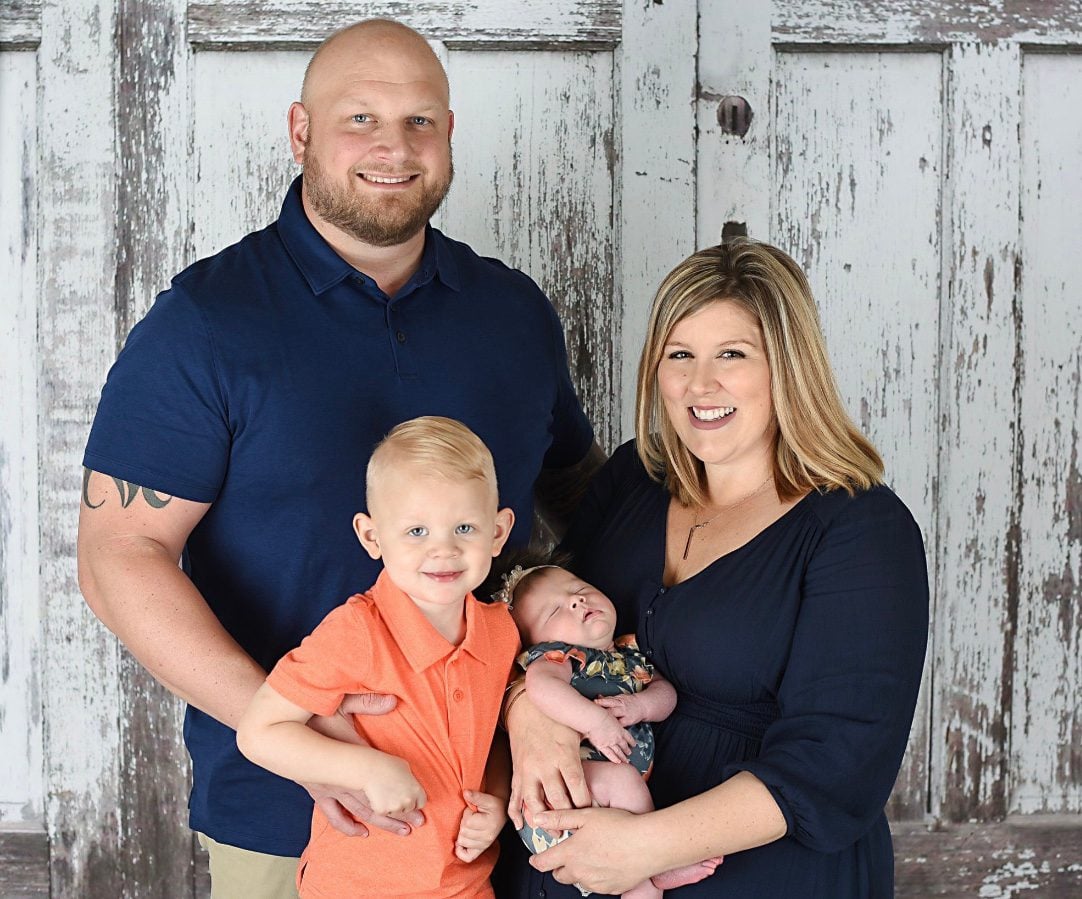
Life as a three-time cancer survivor
These days, I’m doing great. I appreciate the good times I’m experiencing now because I know how much worse it can get. I try to live every day as normally as I can. I also try to talk to people with cancer and going through treatment about the things their doctors won’t talk to them about. I provide caution that you can’t hold onto the finish line too hard because they will move it back real fast on you.
And I value the three Fs: faith, family, and finding the funny. I had faith I was going to outlast whatever anyone was going to do to me. I did, and I’m thankful for it every day.
—As told to Alyssa Sybertz














